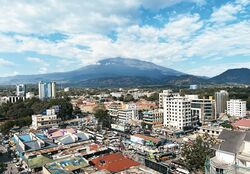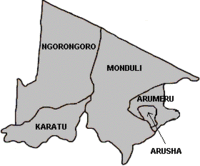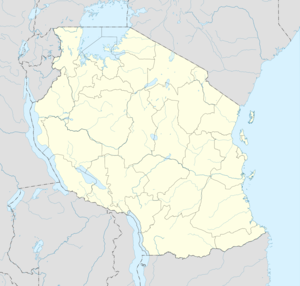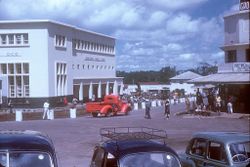أروشا
| ||||||||||||||||||||||||||||||||||||||||||||||
| ||||||||||||||||||||||||||||||||||||||||||||||
أروشا هي مدينة في شمال تنزانيا تحيطها بعض المناظر الطبيعية، والتي تعد الأكثر شهرة في أفريقيا، وتضم العديد من المتنزهات الوطنية. تقع المدينة أسفل جبل ميرو على الحافة الشرقية للفرع الشرقي من وادي الصدع العظيم، تتمتع بمناخ لطيف، تقرب المدينة من سرنگتي، وفوهة نگورنگورو، وبحيرة منيارة، وخانق أولدوڤاي، وحديقة تارانگيرى الوطنية، وجبل كليمنجارو، هذا بالإضافة إلى حديقة أروشا الوطنية في جبل مـِرو. أروشا هي عاصمة منطقة أروشا ويبلغ عدد سكانها 416,442 نسمة زائد 323,198 نسمة في مقاطعة ريف أروشا المحيطة بها (تعداد 2012).[1] منذ عام 1994، تستضيف المحكمة الجنائية الدولية لرواندا.
The city of Arusha is a major international diplomatic hub. It hosts the African Court[2] of the African Union and is the capital of the East African Community. From 1994 to 2015, the city also hosted the International Criminal Tribunal for Rwanda, but that entity has ceased operations. It is a multicultural city with a majority Tanzanian population of mixed backgrounds: indigenous African, Arab-Tanzanian and Indian-Tanzanian population, plus a small European and North American minority population. Religions of the Arusha city population include Christianity, Islam, Sikhism and Hinduism. In 2018, it was declared Arusha City would be the capital city of the proposed East African Federation due to it being seen as a neutral city that does not serve as the political centre of any of the constituent countries. The city also has significance to the whole of East Africa due to its long history of hosting important East African events and institutions.
التاريخ
The current site of Arusha was first settled in the 1830s by the agro-pastoral Arusha Maasai from the Arusha Chini community, south of Mount Kilimanjaro.[3] They traded grains, honey, beer, and tobacco with the pastoral Kisongo Maasai in exchange for livestock, milk, meat, and skins.[3] Demand for Arusha's foodstuffs increased substantially during the 1860s when the Pangani Valley trade route was extended through Old Moshi, Arusha, and ultimately to western Kenya.[3] Although it was not yet a town, it was a regional centre and had a number of urban features.[3]
Arusha was conquered by the Germans in 1896 after the murder of the first two missionaries who attempted to settle on nearby Mount Meru.[3] The Germans established a permanent presence in 1900 when a military fort (a boma) was built and soldiers were garrisoned there.[3] "The boma was a solid statement, meant to impress German moral and political order on the surrounding countryside. Set on a rise overlooking the plains, the fortress-like building dominated the surrounding landscape" complete with a machine gun.[3] Many Africans were forcibly displaced from their ancestral lands by the Germans and forced to dig lime or carry stones to construct the fort.[3]
The British took Arusha from the Germans in 1916 during World War I.[3] German officials left the area, the British deported German missionaries and settlers, and only a skeletal military administration of the town remained.[3] But slowly during the 1920s, civilian administration was implemented, missionaries from the United States arrived, British and Greek settlers reoccupied the former German farms, and the town grew, especially after the British moved the regional administration from New Moshi to Arusha.[3] The extension of the railroad from Moshi to Arusha in 1928-29 greatly increased commerce.[3] The Great Depression soon thereafter, however, squelched commerce, and Arusha in 1940 had fewer than 2,000 residents.[3] Growth resumed during World War II and by 1948, the population had increased to more than 5,000.[3] By the 1950s, Arusha was "a polyglot, westernized little town; it has a Greek community, several Germans predating World War I, and some German Jewish refugees post-dating World War II."[4] A state of emergency was declared in the Arusha region in 1953 in response to the Mau Mau Uprising. Journalist John Gunther noted at the time that "a loyal tribe, the Waarusha, threatened to take violent countermeasures against the Kikuyus themselves, if the British did not. The authorities arrested the leading Mau Mau conspirators, screened thousands more, and deported other thousands back to Kenya."[4]
In the 1960s parts of the movie Hatari! with John Wayne were filmed at Momella.
Arusha has been a crucial city in the history of modern Tanzania. Official documents ceding independence to Tanganyika were signed by the United Kingdom at Arusha in 1961. Also, the Arusha Declaration was signed in 1967 in Arusha.
The Arusha Accords were signed at the city of Arusha on August 4, 1993, by representatives of competing factions in the Rwandan civil war.
The Arusha Peace and Reconciliation Agreement for Burundi was signed on 28 August 2000 as part of a process forging peace in that country through power sharing and establishing a transitional government.
The January 2015 Arusha Agreement for South Sudan created a framework for the reunification of South Sudan's ruling SPLM party, which had splintered into three creating a humanitarian crisis as fighting between factions intensified. It provided that all SPLM members who were dismissed be reinstated to their previous positions and a secret ballot system be adopted.[5]
In 1994 the UN Security Council decided by its Resolution 955 of 8 November 1994 that Arusha should host the International Criminal Tribunal for Rwanda. The establishment of the tribunal with its foreign employees has influenced the local economy of the city increasing the cost of living for residents. The tribunal has downsized due to its closure in 2014, but its legal successor, the International Residual Mechanism for Criminal Tribunals established by United Nations Security Council Resolution 1966, will continue entertaining a branch in Arusha, opening on 1 July 2012. The tribunal indicted 93 individuals and sentenced 62.[6]
Arusha was officially declared a city on 1 July 2006 by the Tanzanian government.[7]
In 2013, a quarry located in Arusha collapsed and killed 14 miners after heavy rain.[8]

| السنة | تعداد | ±% |
|---|---|---|
| 1978 | 55٬223 | — |
| 1988 | 102٬544 | +85.7% |
| 2002 | 333٬791 | +225.5% |
| 2012 | 416٬442 | +24.8% |
| source:[9] | ||
الاقتصاد
The primary industry of the city is the service sector. The city hosts numerous small and large businesses from retail to commercial enterprises.
الخدمات المالية
The city hosts numerous small and large banking businesses.
الصناعة
The city of Arusha is home to the largest manufacturing sector in the region with breweries and agro-forest processing, and a large pharmaceuticals maker.
السياحة
Tourism is also a major part of the economy of the city of Arusha, and the largest dollar-earning economic sector in Tanzania. The city is located on the northern safari circuit near some of the greatest national parks and game reserves in Africa, including Serengeti National Park, Kilimanjaro National Park, Ngorongoro Conservation Area, Arusha National Park, Lake Manyara National Park, and Tarangire National Park.
الجمعيات الأهلية
A number of non-governmental organisations operate in Arusha, including a number which focus on areas such as HIV and AIDS Awareness, children's education, and micro-finance.
The city's Arusha International Conference Center hosts many conference meetings.
المنظمات الدولية
Arusha is home to a number of notable intergovernmental organisations. The city of Arusha is the headquarters of the East African Community,[10] hosts a branch of the International Residual Mechanism for Criminal Tribunals,[11] and the African Court on Human and Peoples' Rights.[12]
الجغرافيا
تقريباً داخل المدينة بأكملها، الذهاب إلى الجنوب هو دائما إلى أسفل التل.
المناخ
برغم قربها الشديد لخط الاستواء, إلا أن أرتفاع المدينة 1,400 م عن سطح البحر، يجعل طقسها لطيف، فتستقر درحة الحرارة بين 13 الي 25 درجة، إلا أنها تتميز بالمواسم الرطبة والجافة، الخبرات والرياح السائدة الشرقية الآتية من المحيط الهندي، بضع مئات من الأميال شرقاً.
| بيانات المناخ لـ أروشا | |||||||||||||
|---|---|---|---|---|---|---|---|---|---|---|---|---|---|
| الشهر | ينا | فب | مار | أبر | ماي | يون | يول | أغس | سبت | أكت | نوف | ديس | السنة |
| متوسط القصوى اليومية °س (°ف) | 29 (84) |
29 (84) |
27 (81) |
25 (77) |
22 (72) |
21 (70) |
21 (69) |
22 (72) |
24 (76) |
27 (80) |
27 (81) |
27 (81) |
25 (77) |
| متوسط الدنيا اليومية °س (°ف) | 10 (50) |
11 (51) |
12 (53) |
14 (57) |
11 (52) |
9 (48) |
9 (49) |
9 (48) |
8 (47) |
11 (51) |
11 (51) |
10 (50) |
10 (51) |
| متوسط تساقط الأمطار mm (inches) | 58 (2.3) |
84 (3.3) |
180 (7) |
370 (14.5) |
210 (8.3) |
33 (1.3) |
15 (0.6) |
20 (0.8) |
20 (0.8) |
36 (1.4) |
110 (4.4) |
100 (4) |
1٬236 (48.7) |
| [citation needed] | |||||||||||||
الأديان المتواجدة في أروشا هي الكاثوليكية، والإنجيلية واليهودية والإسلام، والهندوسية.
في الثقافة الشعبية
كانت أروشا مسرحًا لفيلم 1962 "[Hatari!]]" ، من إخراج هوارد هوكس وبطولة جون واين.
ويُزعم أن أروشا هي نقطة المنتصف بين كيپ تاون والقاهرة.[14]
المدن الشقيقة
 مورتستسوشلاگ (النمسا)
مورتستسوشلاگ (النمسا) كانزس سيتي، مزوري (الولايات المتحدة)
كانزس سيتي، مزوري (الولايات المتحدة) درم، نورث كارولاينا (الولايات المتحدة)
درم، نورث كارولاينا (الولايات المتحدة) تيفاريتي، الجمهورية العربية الصحراوية
تيفاريتي، الجمهورية العربية الصحراوية
انظر أيضاً
- اتفاقيات أروشا Arusha Accords
- مركز أروشا للتراث الثقافي
- إعلان أروشا Arusha Declaration
- أروشا، المنتزه الوطني
- منطقة أروشا
- بحيرة منيارة
- Longido
- جبل مرو (تنزانيا)
- Selian
- تنزانيا
- United Nations Security Council resolution
الهامش
- ^ أ ب "Population Distribution by Administrative Areas, 2012 Population and Housing Census, National Bureau of Statistics, United Republic of Tanzania, 2013, page 26, accessed 1 November 2014". Retrieved 12 June 2018.
- ^ "Host Agreement Between the Government of the United Republic of Tanzania and the African Union" (PDF).
- ^ أ ب ت ث ج ح خ د ذ ر ز س ش ص "'A Town of Strangers' or a 'Model Modern East African Town'? Arusha & the Arusha", authored by Thomas Spear, in Africa's Urban Past, edited by David Anderson and Richard Rathbone, James Currey Publishers, 2000, accessed 31 October 2014
- ^ أ ب Gunther, John (1955). Inside Africa. Harper & Brothers. pp. 398–399. ISBN 0836981979.
- ^ Oduha, Joseph (19 May 2016). "The EastAfrican". allafrica.com. The EastAfrican. Retrieved 23 May 2016.
- ^ "The ICTR in Brief | United Nations International Criminal Tribunal for Rwanda".
- ^ "Arusha Times". Archived from the original on 16 October 2007. Retrieved 12 June 2018.
- ^ "Tanzania quarry collapse kills 14". BBC News. 2 April 2013. Retrieved 12 June 2018.
- ^ Arusha population statistics
- ^ "About EAC". East African Community. Archived from the original on 2020-10-30. Retrieved 2020-12-26.
- ^ "Contacts". International Residual Mechanism for Criminal Tribunals (in الإنجليزية). United Nations. Archived from the original on 2020-12-26. Retrieved 2020-12-26.
{{cite web}}:|archive-date=/|archive-url=timestamp mismatch; 2020-12-27 suggested (help) - ^ "African Court on Human and Peoples' Rights". African Court on Human and Peoples' Rights. Archived from the original on 2020-11-24. Retrieved 2020-12-26.
- ^ "Weatherbase: Historical Weather for Arusha, Tanzania". Weatherbase. 2011. Retrieved on November 24, 2011.
- ^ "Arusha, midway BTW. Cape Town + Cairo – 3 Wisdoms | Scott Randall Paine".
وصلات خارجية
- ذي أروشا تايمز
- جامعة أروشا
- Arusha Volunteers-affordable volunteer opportunities in Tanzania
- جامعة ماونت مرو
- كلية جامعة ماكوميرا
- Institute of Accountancy Arusha
- Arusha Technical College
- The Nelson Mandela African Institute of Science and Technology
- Tanzania Wildlife Research Institute
- Forestry Training Institute Olmotonyi (FTI)
- MS Training Centre for Development Cooperation (MS-TCDC)
- Eastern and Southern Africa Management Institute
- National College of Tourism - Arusha Campus
- Arusha NGO Network
- Website of the Arusha Times
- AroundArusha.com
- International School Moshi (Arusha Campus)
- The Umoja Centre
- Kisongo Academic college
- No Limits Foundation
- St. Constantine's international school
- School of St Jude
- Braeburn schools Arusha
- Mambo Arusha
- David Marsh's Childhood Map of European Area of Arusha, ca. 1956
- MSN Map - elevation = 1254m
- Penn Museum Archival Video
- Pages using gadget WikiMiniAtlas
- CS1 errors: archive-url
- Short description is different from Wikidata
- Articles containing سواحيلي (لغة كبرى)-language text
- Coordinates on Wikidata
- Articles with unsourced statements from November 2011
- أروشا
- أماكن مأهولة في منطقة أروشا
- عواصم مناطق تنزانيا
- تأسيسات 1900 في شرق أفريقيا الألماني









